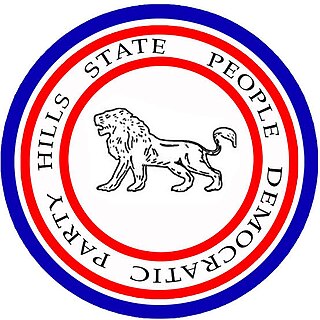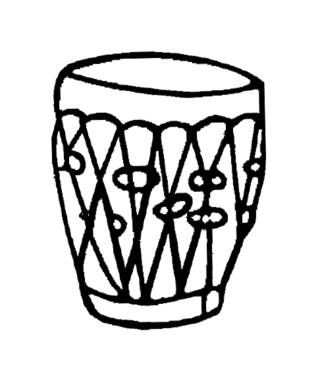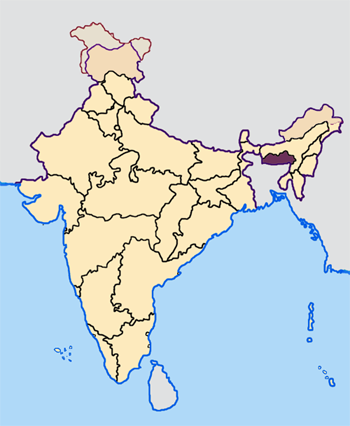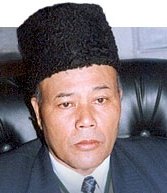
The Hill State People's Democratic Party (HSPDP) is a regional political party active in the state of Meghalaya, northeast India. Formed in 1968 as a split from the All Party Hill Leaders Conference by Hopingstone Lyngdoh, the HSPDP has had representatives in the Meghalaya Legislative Assembly since the Assembly's first elections in 1972. The HSPDP has been a junior member of coalition governments in Meghalaya on a number of occasions and following the 2018 election joined the National People's Party-led government of Chief Minister Conrad Sangma.

The United Democratic Party is a political party recognised in Meghalaya state, India. It is now led by Metbah Lyngdoh. It was started by E. K. Mawlong.

The Meghalaya Legislative Assembly election of 2008 took place in a single phase on 3 March 2008 to elect the Members of the Legislative Assembly (MLA) from each of the 60 Assembly Constituencies (ACs) in Meghalaya, India. Counting of votes happened on 7 March 2008 and because of the use of Electronic Voting Machines (EVMs) in this election, the results were ready within the day.
The Meghalaya Democratic Alliance (MDA) was a coalition of political parties that formed the Government in the state of Meghalaya, India, after the 2003 Legislative Assembly election. It was headed by the Indian National Congress (INC), which was the party with the largest number of seats in the 7th Meghalaya Legislative Assembly. Chief Minister D. D. Lapang and the other ministers in the Government were all members of the MDA. D. D. Lapang also served as the Chairperson of the MDA.

Dr. Flinder Anderson Khonglam was an Indian politician and physician. He served as the eighth Chief Minister of Meghalaya from 2001 to 2003. Khonglam was the first independent legislator to serve as the Chief Minister of any Indian state in history.
Evansius Kek Mawlong was an Indian politician who served as the Chief Minister of Meghalaya from 8 March 2000, until 8 December 2001. He was the main architect in the formation of the United Democratic Party in Meghalaya and was its Founding President.
The North-East Democratic Alliance is a political coalition that was formed on May 24, 2016, by Bharatiya Janata Party. The motive of the new political front was to unite non-Congress parties in Northeast India. Himanta Biswa Sarma was appointed as the convenor of the front.
Elections in the Republic of India in 2018 included by-elections to the Lok Sabha, elections to the Rajya Sabha, elections to of eight states and numerous other by-elections to state legislative assemblies, councils and local bodies.

The Meghalaya Legislative Assembly election was held on 27 February 2018 to elect 59 of 60 members to the Meghalaya Legislative Assembly, with the results declared on 3 March. The scheduled election in Williamnagar constituency was delayed to an undetermined date following the death of Nationalist Congress Party candidate Jonathone Sangma in an IED blast in East Garo Hills district on 18 February 2018. The incumbent Indian National Congress government, led by Chief Minister Mukul Sangma, attempted to win re-election for the third consecutive time.

The elections to the 13th Nagaland State Legislative Assembly was held on 27th February 2018 in 59 out of its 60 constituencies, with one member elected unopposed. The counting of votes took place on 3rd March 2018. The incumbent Naga People's Front (NPF) lost the elections, while Chief minister T. R. Zeliang retained his seat. Former NPF leader, Neiphiu Rio joined the Nationalist Democratic Progressive Party (NDPP) before the elections. Subsequently, with two-thirds majority in the assembly, the NDPP-Bharatiya Janata Party alliance formed the government with Rio as the new Chief Minister of Nagaland.
The Public Demands Implementation Convention (PDIC)[b] was a regional political party in Meghalaya, India founded in 1977 and primarily focussed on the interests of farmers, especially those growing potatoes in the Khyrim area of the Khasi Hills. The party was a split from the All Party Hill Leaders Conference.

Selsella is one of the 60 Legislative Assembly constituencies of Meghalaya state in India. It is part of West Garo Hills district and is reserved for candidates belonging to the Scheduled Tribes. It falls under Tura Lok Sabha constituency and its current MLA is Arbinstone B. Marak of National People's Party.
The 2003 Meghalaya Legislative Assembly election was held on 26 February 2003. The north-east Indian state's seventh Legislative Assembly election saw major changes with 28 sitting members and two former Chief Ministers losing their seats. The election also produced the largest representation for the national parties and, to that point, the smallest representation for the regional parties. No party won a majority of seats and despite more than a five percent loss in the popular vote compared to the 1998 election, the INC secured a plurality. Initially, the NCP under leader E. D. Marak attempted to form a government, but failed to secure support for a majority. Subsequently, D. D. Lapang was invited by Governor M. M. Jacob to present a majority, which was successfully achieved through the formation of the Meghalaya Democratic Alliance (MDA) coalition. Made up of 42 members of the Legislative Assembly (MLAs), the MDA consisted of the INC, the United Democratic Party (UDP), the Meghalaya Democratic Party (MDP), the Khun Hynniewtrep National Awakening Movement (KHNAM) and three independents. D.D. Lapang was confirmed as Chief Minister with Donkupar Roy of the UPD as Deputy Chief Minister.
The 1972 Meghalaya Legislative Assembly election was held on 9 March 1972. These were Meghalaya's first Legislative Assembly elections, following the creation of the state on 21 January 1972. 59 men and one woman, Percylina Marak, were elected.
The 1978 Meghalaya Legislative Assembly election was held on 25 February 1978. No party secured a majority of seats in the election. Following negotiations, a coalition government, known as the Meghalaya United Legislative Party, was formed between the All Party Hill Leaders Conference, the Hill State People's Democratic Party and the Public Demands Implementation Convention (PDIC). Due to an inability to reach agreement between the coalition parties, the position of Chief Minister was chosen by drawing lots; subsequently, on 10 March 1978, Darwin Diengdoh Pugh was sworn in as the state's second Chief Minister. Miriam D Shira from Garo Hills was the only woman elected to the legislature.
The 1988 Meghalaya Legislative Assembly election was held on 2 February 1988. In the lead up to the election, sporadic violence targeted at the Indian Nepali population of the state occurred. No party secured a majority of seats and two women were elected.
The 1993 Meghalaya Legislative Assembly election was held on 19 February 1993.
The 1998 Meghalaya Legislative Assembly election was held on 16 February 1998.
Elections in the Republic of India in 1978 included elections to seven state legislative assemblies.
Elections in the Republic of India in 1983 included elections to six state legislative assemblies and to seats in the Rajya Sabha.







